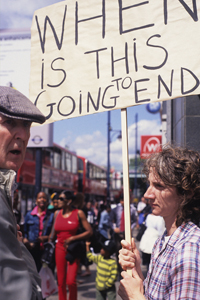Archiv
Communitas
bis 19. Juni 2011 Camera Austria, 8010 Graz
The Unrepresentable Community
Beteiligte Künstler: Martin Beck (A/US), Sabine Bitter / Helmut Weber (A/CA), Sharon Hayes (US), Heidrun Holzfeind (A/US), Maryam Jafri (PK/US), Sanja Ivekovi (HR), Clemens von Wedemeyer (D)
The (political) question of "community" is the focal point for our exhibition activities in 2011. Two projects examine a number of societal phenomena and their critical representation: the proliferation of communities, the formation of groups, that implies an increasing social divide, new discourses on identity, "leading cultures", etc. as a reaction to a - subjectively perceived - loss of societal values and societal cohesion. As a consequence of this, we are, however, equally witnessing an increase in exclusion, deportation, expulsion, punishment and ethnic cleansing - in order to ensure an environment that is not defined by equality, but rather by sameness. In opposition to these drafts of inclusion and exclusion, the two exhibitions encourage a reflection on community that does not insist on common identity, describing coexistence neither as being inside nor outside, but rather as being side-by-side and being near. The first exhibition - The Unrepresentable Community - revolves around questions of criticising representations used to create common identities. The works on show allow us to view community beyond ascribable identities, spaces, specific fields of society or images: as an opportunity, as a utopia, as an unredeemable project that does, however, prevent the closure of society and the essentialisation of communities.
www.lot.at
Communitas
bis 19. Juni 2011 Camera Austria, 8010 Graz
The Unrepresentable Community
Beteiligte Künstler: Martin Beck (A/US), Sabine Bitter / Helmut Weber (A/CA), Sharon Hayes (US), Heidrun Holzfeind (A/US), Maryam Jafri (PK/US), Sanja Ivekovi (HR), Clemens von Wedemeyer (D)
The (political) question of "community" is the focal point for our exhibition activities in 2011. Two projects examine a number of societal phenomena and their critical representation: the proliferation of communities, the formation of groups, that implies an increasing social divide, new discourses on identity, "leading cultures", etc. as a reaction to a - subjectively perceived - loss of societal values and societal cohesion. As a consequence of this, we are, however, equally witnessing an increase in exclusion, deportation, expulsion, punishment and ethnic cleansing - in order to ensure an environment that is not defined by equality, but rather by sameness. In opposition to these drafts of inclusion and exclusion, the two exhibitions encourage a reflection on community that does not insist on common identity, describing coexistence neither as being inside nor outside, but rather as being side-by-side and being near. The first exhibition - The Unrepresentable Community - revolves around questions of criticising representations used to create common identities. The works on show allow us to view community beyond ascribable identities, spaces, specific fields of society or images: as an opportunity, as a utopia, as an unredeemable project that does, however, prevent the closure of society and the essentialisation of communities.
www.lot.at

